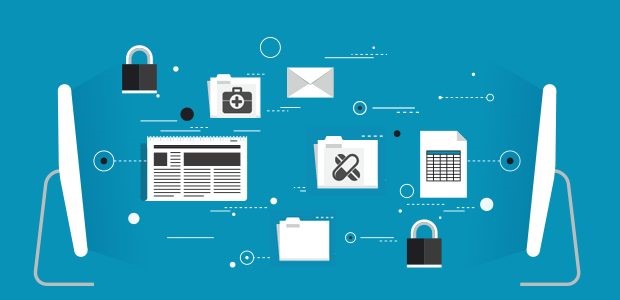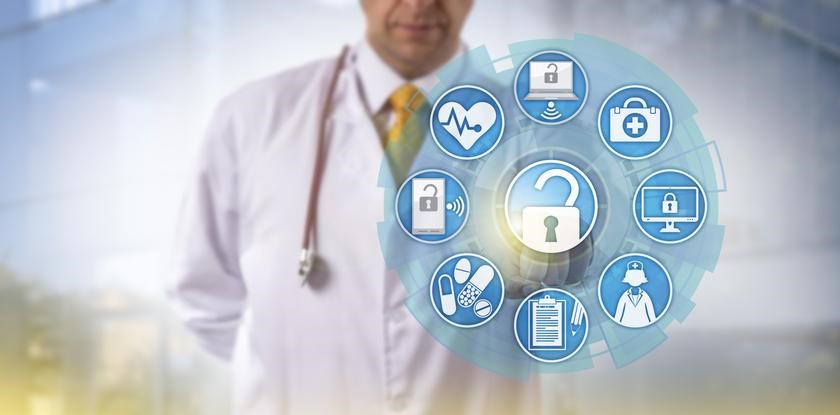Healthcare Cybersecurity: Tips for Securing Private Health Data
Privacy and security are the most critical issues for any customer. The healthcare industry has always been a hot spot for cyber threats. Over the last years, the volume of losses has comprised over 13 billion. When it comes to the protection of health information, special security measures should be taken to protect patients’ data and exclude possible data breaches, not affecting the delivery of care.
Because of enormous volumes of data stored, the healthcare industry has become more dependent on technology. According to the different statistics, healthcare software development should adapt the technologies in order to create a strong security shield understanding the main pain points and threats.
Here are the most widespread headaches and challenges faced in healthcare:
- Common ransomware attacks
Cybercriminals send e-mails with malicious links. When the virus impacts the network, it slows down all the system operations and processes, until the ransom will be paid to the criminal.
- Data breaches
The Healthcare industry regularly undergoes data breaches due to poor security monitoring. Unfortunately, the safety of private data is often overlooked. Moreover, issues connected to HIPAA compliance arise. Most healthcare institutions are not informed about the latest security protocols and measures. It allows cybercriminals to access private patients’ data impacting the reputation of the hospital.
- Threats connected to employee irresponsibility
Irresponsible employees may disclose sensitive data to the black market for the sake of the big sum of money. They could be aware of networks setup vulnerabilities, access codes and share the sensitive data and uncover it to cybercriminals.
- DDoS attacks
This type of attack is especially dangerous for healthcare providers who need access to networks for providing healthcare services. In the case of this attack, the network is overloaded with vast amounts of data from millions of computers.
- Cloud-storage threats
Some cloud-based healthcare solutions do not stick to HIPAA compliance, thus turning such data systems into an easily accessible target for cyber threats.
- Phishing
This type of threat affects the private details of patients aiming to get access to passwords through emails, requiring them to change the existing passwords. Thus, the criminals access sensitive data and put your organization at risk.
Being aware of the major potential threats makes it easier to take preventative measures. Healthcare organizations should balance the security protection with the high-quality service being oriented on security regulations including HIPAA, GDPR and PHI guidelines.
Tips for securing your private data healthcare

Today exists a variety of compliance practices and security measures that can be implemented to adequately protect private sensitive data. Moreover, a complex approach should be taken to address the possible risks and strengthen the security shield. Here are the ways to do it:
- Raising the awareness of the personnel
The biggest threat to security is the user itself. User irresponsibility may cause expensive consequences and have a disastrous effect on the reputation of the organization. Training employees and raising awareness will pay off in the long run and decrease the number of data breaches.
- Implementation of access controls
With the support of relevant software, it is possible to integrate the appropriate CRM systems allowing the needed employees to get access to the necessary data. It diminishes the opportunity of the sensitive data being accessed by the wrong hands.
- Data usage control
Implementation of data usage control modules allows ensuring the spotting of malicious activity. It makes the monitoring more efficient, allows blocking suspicious actions, and allows posing the proper level of protection depending on the type of data.
- Usage monitoring
Implementation of the advanced monitoring systems allows controlling which users are accessing the information, the type of device, and location. In case the security breach occurs, it is easier to identify the entry points and evaluate the damages.
- Data encryption
Data encryption makes it inaccessible for attackers even if they get it. Exists various encryption methods and guidelines depending on the workflow type and organizational needs.
- Mobile security
Implementation of secure mobile devices and networks, setting the right security configurations, the establishment of device-level passwords.
- Regular data backups
Frequent data backups allow organizations to have their data in a safe place in case of unpredicted circumstances. Enhanced with strict control over data encryption it is an essential measure in case of need of disaster recovery.
- Risks assessment practices
Regular audits allow tracing and predicting causes and valuable details in case a security attack occurs. Regular risks analyses allow detecting the potential risks and taking quick and efficient preventative measures. It saves time, costs, and the reputation of the organization.
The multifaceted approach to security is budget- and effort-consuming. However, the information and data that is stored in healthcare organization systems is extremely valuable. When it can affect the reputation of your organization, and you cannot guarantee privacy to your patients, it automatically decreases the loyalty and trust to your service. Unfortunately, these aspects are often overlooked. According to Statista, the average cost of a data breach reaches up to 9,3 million USD.
The healthcare organization that values its patients and cares about the safety of data stored should have the support of a reliable tech partner. Advanced IT professionals are responsible for coverage of the main risks mitigation measures and provide tools for efficient data protection. They are aware of the sensitive nature of electronic health records (EHR) and take into account the main HIPAA compliance. Thus, make sure to take care of the tech support of your healthcare organization and raise the security for the sake of your patients.

